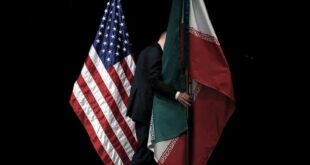 TEHRAN (Fars News Agency)- Iran and Syria on Thursday denounced President Bush’s new Iraq strategy that blames them for fueling violence in the war-torn country, and they said the plan to send more US troops would only increase bloodshed.
TEHRAN (Fars News Agency)- Iran and Syria on Thursday denounced President Bush’s new Iraq strategy that blames them for fueling violence in the war-torn country, and they said the plan to send more US troops would only increase bloodshed.
Bush’s speech Wednesday night underlined his staunch rejection of recommendations that Washington reach out to Syria and Iran in an attempt to calm Iraq.
Instead, Bush set out plans to isolate the two countries, calling on help from Arab allies. He announced the deployment of an additional aircraft carrier battle group and Patriot air defense missiles to the region – seen as muscle-flexing toward Iran.
In Tehran, Foreign Ministry spokesman Mohammad Ali Hosseini said Bush’s plan to send 21,000 more troops to Iraq was a “continuation of occupation” that will only “extend insecurity, danger and tension in the country. This will not help to solve Iraq’s problems.”
Syrian Vice President Farouk al-Sharaa said Wednesday prior to Bush’s speech that the American troop surge was “not a positive step” and would only “pour oil on the fire.”
As Bush spoke in Washington, US-led multinational forces detained five Iranians in an overnight raid on Tehran’s diplomatic mission in the northern Iraqi city of Erbil.
Iranian Foreign Ministry spokesman Mohammad Ali Hosseini denounced the raid, saying it reflected a “continuation of pressure” on Iran, aiming to “create tension” between Iraq and its neighbors.
The bipartisan Iraqi Study Group said last month the US should put aside misgivings and engage Syria and Iran in negotiations on Iraq’s future.
However, Bush has said he would not deal with the two countries.
Iran and Syria both denied supporting fighters in Iraq. Hosseini said the US was trying to “cover up its wrong policies” by accusing other countries of meddling in Iraq.
The new offensive by US forces, along with Iraqi troops, aims to put down both Sunni insurgents and Shiite militiamen in Baghdad. But there was widespread skepticism in the Arab world that the Shiite-led Iraqi government of Prime Minister Nouri al-Maliki will act against the militias, even though it has said it will.
Iran depicted the US plan as an attempt to control Iraq for the benefit of Israel. Hosseini said the deployment of Patriot missiles in the region “is part of the US policy direction to create a support umbrella for the Zionist regime through an Islamic country.”
Commentators in Iran and Syria predicted the new Bush strategy would fail. The plan’s “failure will register the name of Bush as a vanquished president in the political history of the US,” Iranian state television said in a commentary.
In Damascus, there were signs of disappointment that Washington had rejected the idea of opening a dialogue with the country. Syrian analyst Imad Shueibi, who often reflects the government’s view, called Bush’s accusations of Syrian and Iranian support for militants “a worthless broken record.”
“If Bush wants to ignore Syria, he would thereby ignore the possibility of finding a solution to the situation in Iraq and to stability in the region,” he said.
The state-run Syrian newspaper Tishrin predicted “Bush’s strategy will be another catastrophe and the Iraqi people will be the only loser.”
In the streets of Tehran, there was dismay at the prospect of the US increasing its military presence in neighboring Iraq.
“Sending more troops more means more casualties. Any simple military personnel know it,” said Hossein Rahimi, a veteran of Iran’s war with Iraq in the 1980s.
“The US has already spent a lot for military purposes in Iraq. If it had spend it for reconstruction and development, then Iraq could have been a role model for the whole region,” said Reza Mahmoudi, a 50-year-old engineer.
 Eurasia Press & News
Eurasia Press & News


